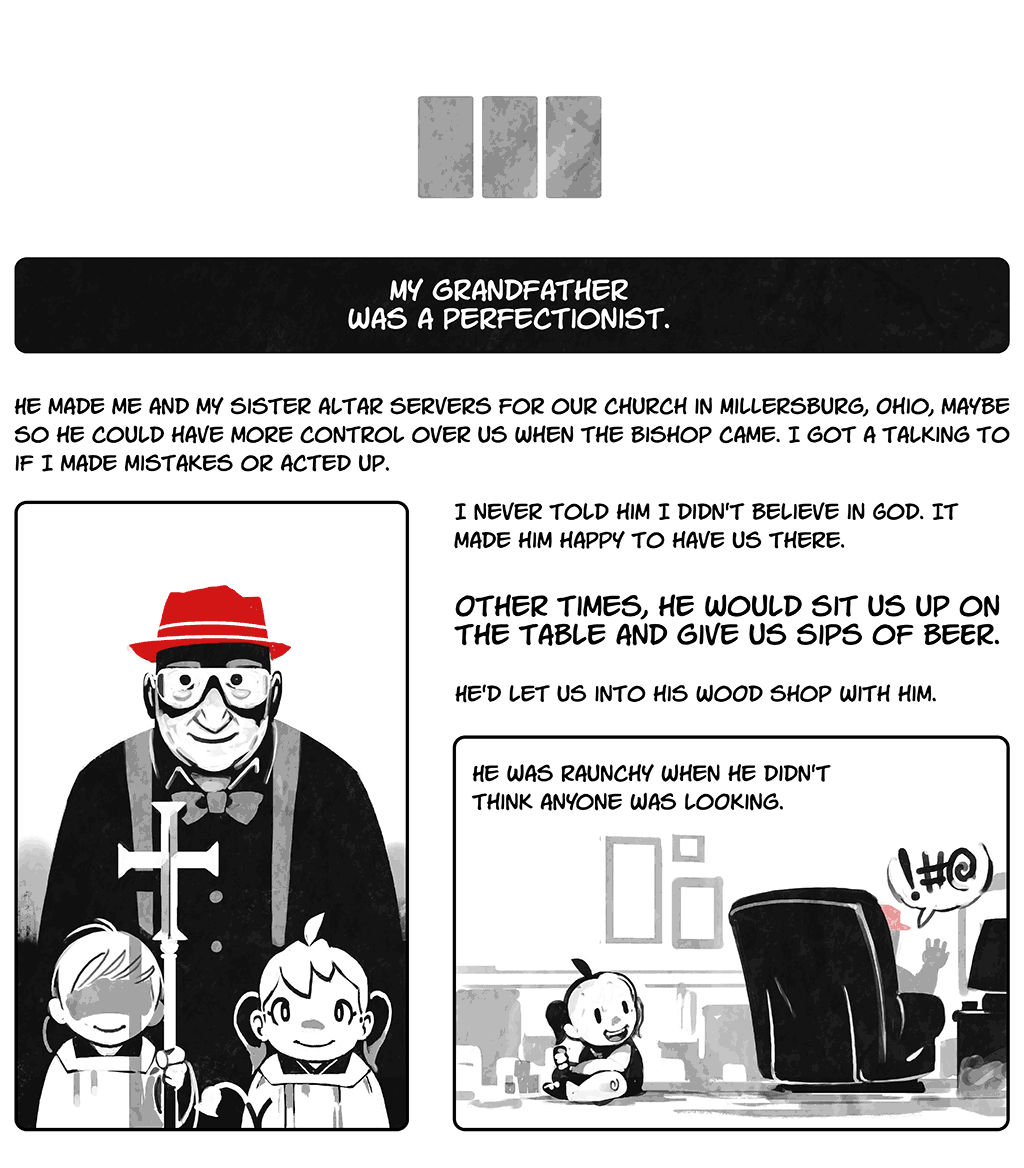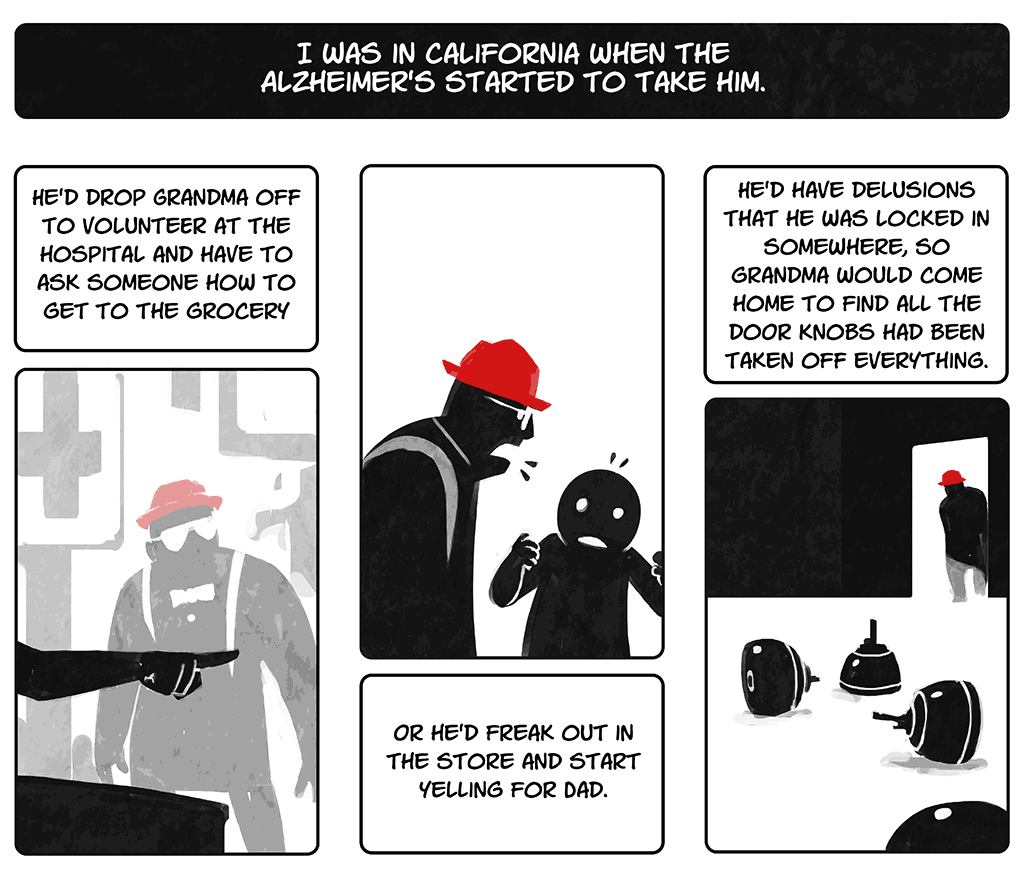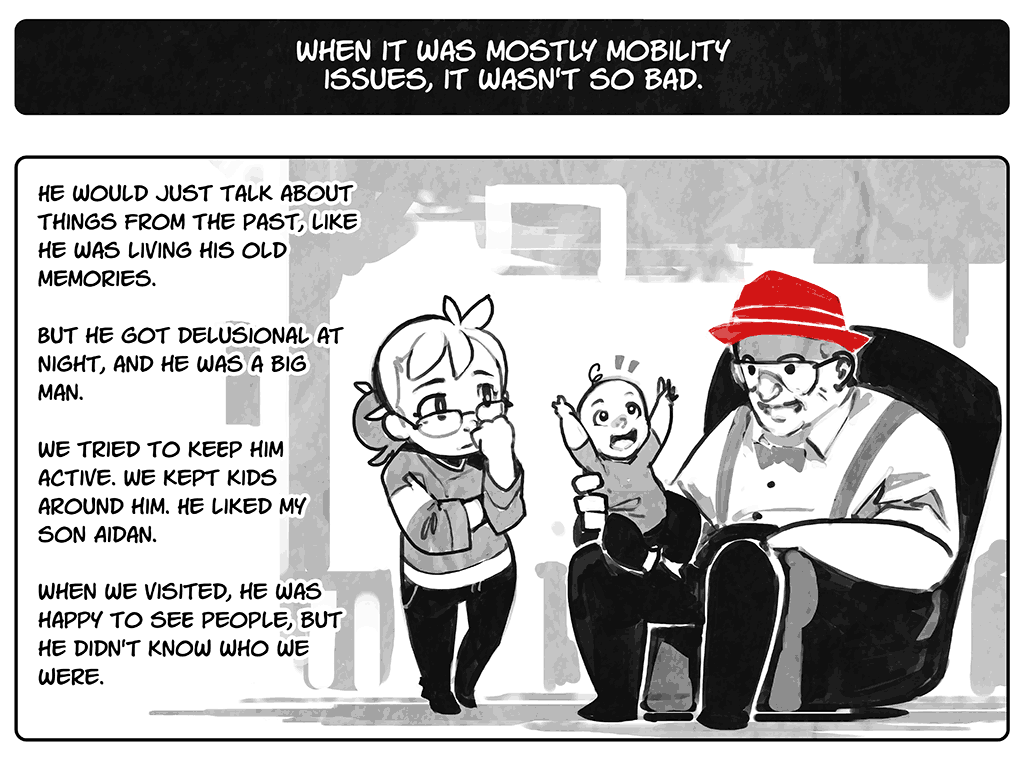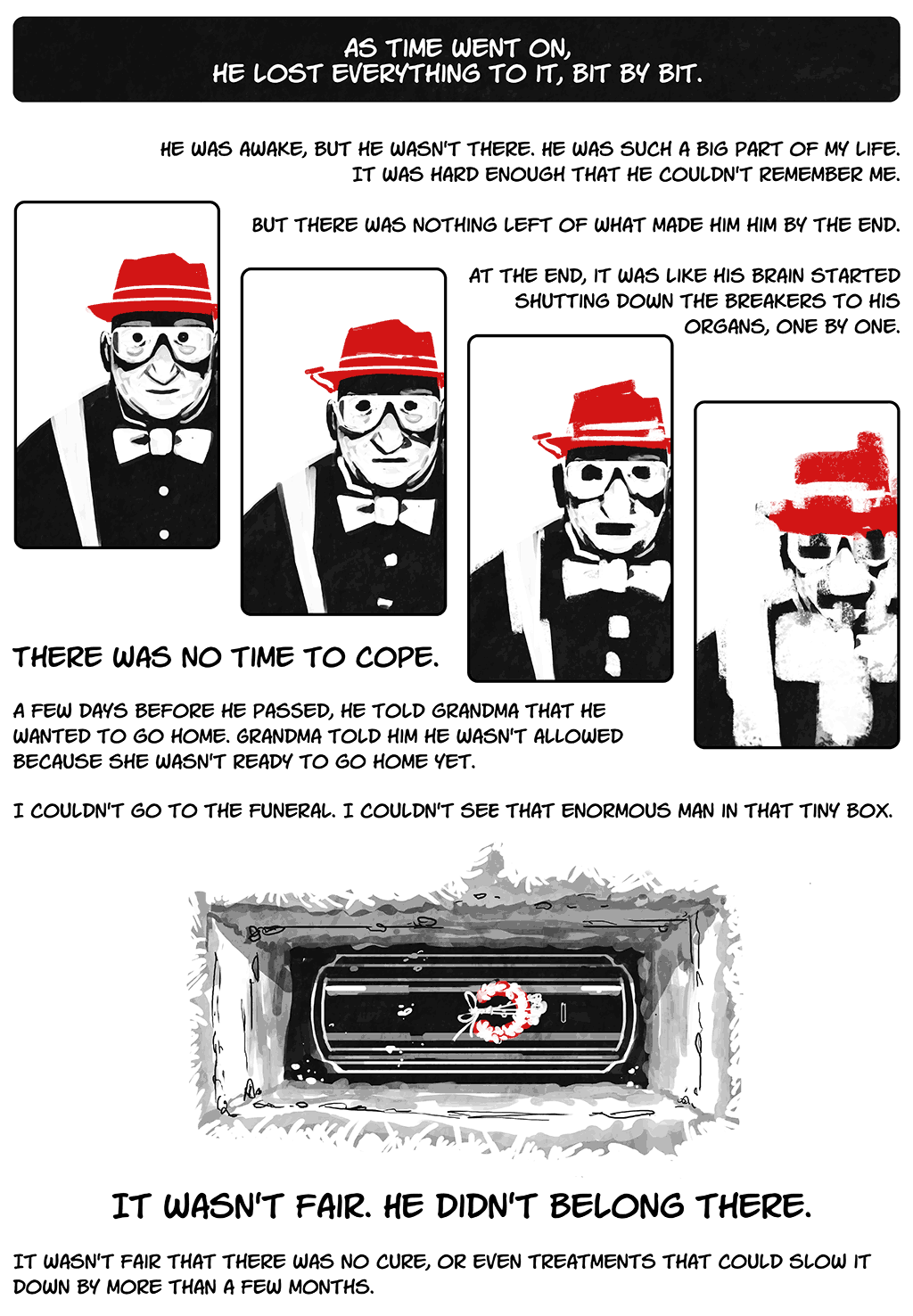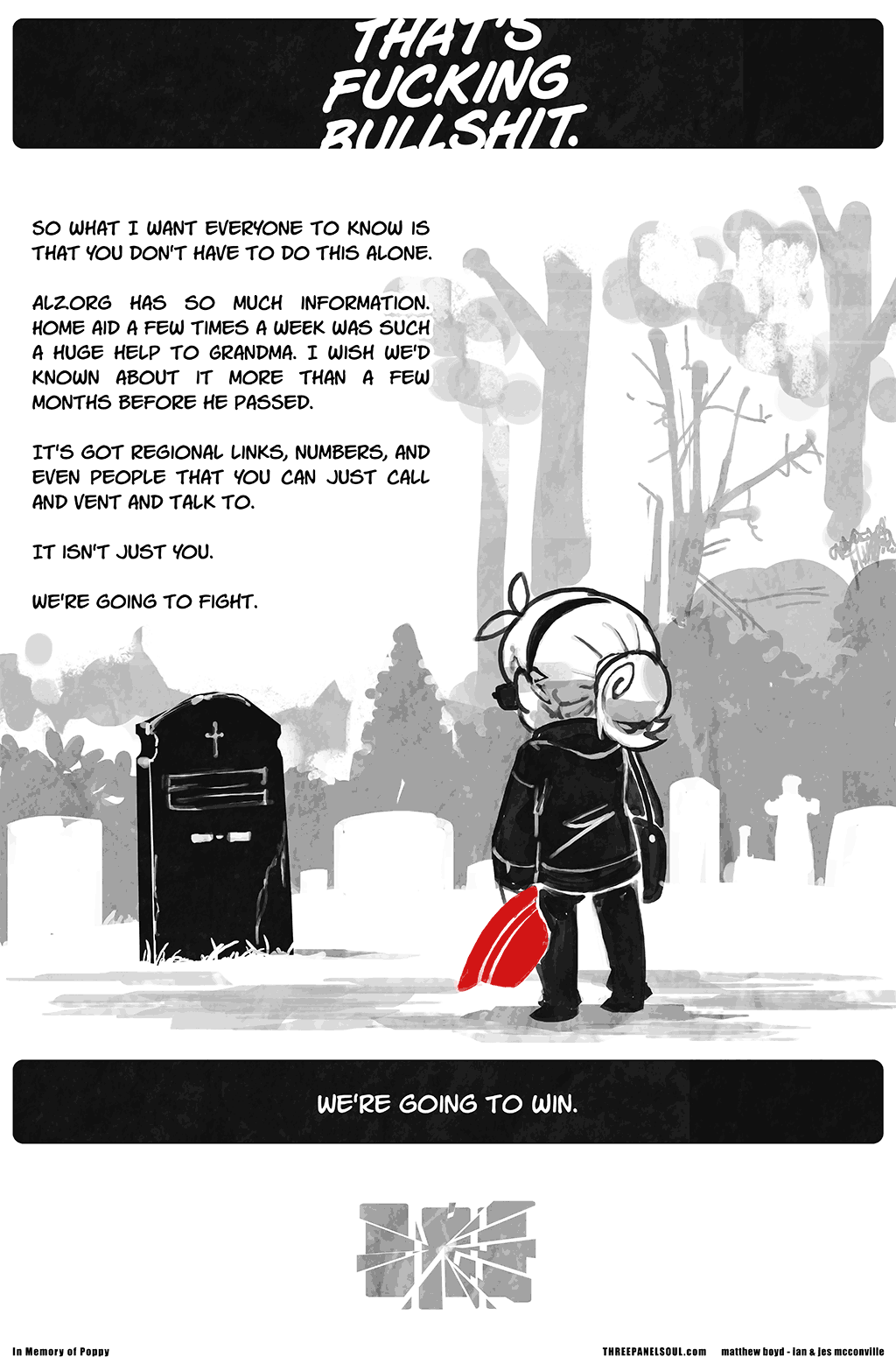The webcomic Three Panel Soul took an unusual departure from its namesake format two weeks ago when it posted a heartfelt comic about losing a loved one to Alzheimer’s disease.
In the comic, called “In Memory of Poppy,” Jes McConville, wife to the comic artist Ian McConville, talks about her memories of her grandfather and what it was like to watch him slip into the undertow of a slow and ruthless disease.
In a phone interview with the Daily Dot, McConville said that her grandfather was diagnosed sometime between 2006 and 2007.
“He’d been kind of off for a little while, but we were chalking it up to him being older and a little crotchety anyway. And the stories were fairly amusing for a while,” she said. But as things became more serious, it stopped being funny.
She said that her grandfather loved her 2-year-old son, but struggled to understand who he was. He would ask who the boy belonged to, but didn’t know who McConville was. Her family would explain how they were related, but he still struggled to understand.
“It’s like the saddest game of ‘Who’s on First,’” she said.
What is Alzheimer’s Disease?
“I didn’t realize there was a difference between dementia and Alzheimer’s,” McConville said.
Dementia refers to a series of symptoms that can have many causes. Alzheimer’s is the most common cause of dementia in older adults, affecting roughly 5 million Americans, according to the National Institute of Aging. It’s slow, progressive, irreversible, untreatable, and fatal.
With the exception of early onset Alzheimer’s, which strikes when people are younger than 65 and is usually linked to genetics, researchers think Alzheimer’s arises from a variety of causes. Genetics, environmental factors, and natural brain aging all seem to participate in a complex game that scientists are only just starting to unravel.
These factors lead to the brain to shrink and individual cells to die. An excess of plaques build up in the brain and interfere with the way neurons talk to one another, and proteins called tau tangle up and suffocate the brain cells further.
It usually starts in the parts of the brain that govern memory, learning, and planning. According to the Alzheimer’s Association, a person can live with “preclinical” Alzheimer’s disease for upwards of two decades. During this time, they may forget simple things like where they left their keys. They may struggle to find the right words. They may momentarily forget people’s names. It’s the sort of thing that can go unnoticed for a long time—everyone has those little brain farts, especially as they get older.
Then the disease spreads as more plaques and tangles develop. This is when it starts to affect patients’ daily lives. People may have trouble handling money or performing daily tasks. Their personality may start to change, and they may feel withdrawn and socially isolated. According to the Alzheimer’s forum, this moderate stage is when people tend to get a diagnosis—and by then the damage is done. Even if medical science had the ability to remove the plaques and tangles—it doesn’t yet—the neural connections that make those everyday tasks possible are already destroyed.
As the disease continues to take hold in the brain and move to the later stages, people gradually lose their ability to move and communicate. On average, the disease progresses over four to eight years.
Why is it so hard to treat?
The key to treating Alzheimer’s is preventing it, but the disease is exceedingly difficult to spot and diagnose in its early stages. By the later stages, the damage is done.
In a blog, the Alzheimer’s Association describes the disease like some horses ransacking a farm after the barn doors are left open. They eat the crops, trample the fields, and generally cause mayhem. You may be able to wrangle the horses, close the barn doors, and try to start anew, but you can’t reverse the damage.
Many of the treatments being studied only address one problem – and often when damage has already been done and it’s too late to reverse it. There are several different factors that contribute to the Alzheimer’s disease process. New treatments and research into the causes and prevention of Alzheimer’s will require a combination of approaches much earlier in the disease process if we are to see results. It’s hard to know which combination(s) will work at which stage in the disease and for how long!
Some treatments do exist that try to improve learning and memory function, but they only work in a few people and for a short time. They don’t affect the underlying causes of the disease.
Other treatments in the works look to target the proteins that lead to the buildup of plaques, beta-amyloids. But those proteins are useful and part of a healthy brain, too, so scientists need a treatment that can stop too much amyloid buildup without destroying the protein completely.
What can you do?
McConville said she mostly had to educate herself on the disease and what her grandfather’s options were to manage it.
“It probably would have helped to have educate myself better before he was gone,” McConville said. “Better education wouldn’t have helped him, but it may have helped the family in general.”
McConville’s family was largely unaware of their options for things like home aid. For most of her grandfather’s disease, his care was left to her grandmother and her aunt.
“It wasn’t even until the end that there was home aids we could get or people you could just call and talk to. It was almost hard to have that info volunteered,” she said.
Doctors weren’t much help to the family. She said that they didn’t mention options like home aids, who could help her grandfather do basic things like eat and bathe, until he needed surgery to remove his gall bladder.
“It just seems like if you’re diagnosed with cancer they go, ‘Here’s all the resources.’ It felt much more closed with the Alzheimer’s diagnosis,” she said.
Caregivers for patients with Alzheimer’s often suffer from their own health problems. Saddled with the task of taking care of a loved one who slowly becomes a shell of their former self leads many to suffer from depression and anxiety.
But it doesn’t have to be that way, McConville said.
She stressed the importance of spending time with her grandfather, and how that made him happy. He may have not known it was his family sitting with him, watching TV and laughing, but she felt that it made a difference in his life.
“[My grandmother and aunt] would go for rides and ask him which way he wanted to go. He’d usually get my aunt lost, but sometimes he’d be able to lead her back out to a road that she knew. He always liked to do that,” she said.
“It’s a very lonely disease, and it doesn’t need to be,” McConville said. “We’re fighting the battle now too to cure it, and it doesn’t really help for the people that we’ve lost, but we have to keep fighting so hopefully our kids and our grandkids won’t have to lose us that way.”
Lead art and comics courtesy of Ian and Jess McConville, Three Panel Soul.


